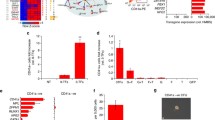Abstract
The differentiation of megakaryocytes from human pluripotent stem cells in vitro offers intriguing new perspectives for research and transfusion medicine. However, applications have been hampered by the low efficiency of cytokine driven differentiation protocols leading to poor megakaryocyte purity and yield. Here we describe a novel forward programming approach relying on the combined ectopic expression of the three transcription factors GATA1, FLI1, and TAL1 in human pluripotent stem cells for large scale production of mature megakaryocytes using chemically defined culture and minimum cytokines.
Access this chapter
Tax calculation will be finalised at checkout
Purchases are for personal use only
Similar content being viewed by others
References
Rossant J, Tam PP (2017) New insights into early human development: lessons for stem cell derivation and differentiation. Cell Stem Cell 20(1):18–28. https://doi.org/10.1016/j.stem.2016.12.004
Takahashi K, Tanabe K, Ohnuki M, Narita M, Ichisaka T, Tomoda K, Yamanaka S (2007) Induction of pluripotent stem cells from adult human fibroblasts by defined factors. Cell 131(5):861–872. https://doi.org/10.1016/j.cell.2007.11.019
Wu SM, Hochedlinger K (2011) Harnessing the potential of induced pluripotent stem cells for regenerative medicine. Nat Cell Biol 13(5):497–505. https://doi.org/10.1038/ncb0511-497
Gaur M, Kamata T, Wang S, Moran B, Shattil SJ, Leavitt AD (2006) Megakaryocytes derived from human embryonic stem cells: a genetically tractable system to study megakaryocytopoiesis and integrin function. J Thromb Haemost 4(2):436–442. https://doi.org/10.1111/j.1538-7836.2006.01744.x
Takayama N, Eto K (2012) Pluripotent stem cells reveal the developmental biology of human megakaryocytes and provide a source of platelets for clinical application. Cell Mol Life Sci. https://doi.org/10.1007/s00018-012-0995-4
Nakamura S, Takayama N, Hirata S, Seo H, Endo H, Ochi K, Fujita K, Koike T, Harimoto K, Dohda T, Watanabe A, Okita K, Takahashi N, Sawaguchi A, Yamanaka S, Nakauchi H, Nishimura S, Eto K (2014) Expandable megakaryocyte cell lines enable clinically applicable generation of platelets from human induced pluripotent stem cells. Cell Stem Cell 14(4):535–548. https://doi.org/10.1016/j.stem.2014.01.011
Feng Q, Shabrani N, Thon JN, Huo H, Thiel A, Machlus KR, Kim K, Brooks J, Li F, Luo C, Kimbrel EA, Wang J, Kim KS, Italiano J, Cho J, Lu SJ, Lanza R (2014) Scalable generation of universal platelets from human induced pluripotent stem cells. Stem Cell Rep 3(5):817–831. https://doi.org/10.1016/j.stemcr.2014.09.010
Pick M, Azzola L, Osborne E, Stanley EG, Elefanty AG (2013) Generation of megakaryocytic progenitors from human embryonic stem cells in a feeder- and serum-free medium. PLoS One 8(2):e55530. https://doi.org/10.1371/journal.pone.0055530
Moreau T, Evans AL, Vasquez L, Tijssen MR, Yan Y, Trotter MW, Howard D, Colzani M, Arumugam M, Wu WH, Dalby A, Lampela R, Bouet G, Hobbs CM, Pask DC, Payne H, Ponomaryov T, Brill A, Soranzo N, Ouwehand WH, Pedersen RA, Ghevaert C (2016) Large-scale production of megakaryocytes from human pluripotent stem cells by chemically defined forward programming. Nat Commun 7:11208. https://doi.org/10.1038/ncomms11208
Heazlewood SY, Nilsson SK, Cartledge K, Be CL, Vinson A, Gel M, Haylock DN (2017) Progress in bio-manufacture of platelets for transfusion. Platelets 28(7):649–656. https://doi.org/10.1080/09537104.2016.1257783
Cahan P, Daley GQ (2013) Origins and implications of pluripotent stem cell variability and heterogeneity. Nat Rev Mol Cell Biol. https://doi.org/10.1038/nrm3584
Rouhani F, Kumasaka N, de Brito MC, Bradley A, Vallier L, Gaffney D (2014) Genetic background drives transcriptional variation in human induced pluripotent stem cells. PLoS Genet 10(6):e1004432. https://doi.org/10.1371/journal.pgen.1004432
Chen G, Gulbranson DR, Hou Z, Bolin JM, Ruotti V, Probasco MD, Smuga-Otto K, Howden SE, Diol NR, Propson NE, Wagner R, Lee GO, Antosiewicz-Bourget J, Teng JM, Thomson JA (2011) Chemically defined conditions for human iPSC derivation and culture. Nat Methods 8(5):424–429. https://doi.org/10.1038/nmeth.1593
Bernardo AS, Faial T, Gardner L, Niakan KK, Ortmann D, Senner CE, Callery EM, Trotter MW, Hemberger M, Smith JC, Bardwell L, Moffett A, Pedersen RA (2011) BRACHYURY and CDX2 mediate BMP-induced differentiation of human and mouse pluripotent stem cells into embryonic and extraembryonic lineages. Cell Stem Cell 9(2):144–155. https://doi.org/10.1016/j.stem.2011.06.015
Watanabe K, Ueno M, Kamiya D, Nishiyama A, Matsumura M, Wataya T, Takahashi JB, Nishikawa S, Nishikawa S, Muguruma K, Sasai Y (2007) A ROCK inhibitor permits survival of dissociated human embryonic stem cells. Nat Biotechnol 25(6):681–686. https://doi.org/10.1038/nbt1310
Acknowledgments
This work was supported by NIHR, NHSBT, MRC grants and a core support grant from the Wellcome Trust and MRC to the Wellcome Trust – Medical Research Council Cambridge Stem Cell Institute.
Author information
Authors and Affiliations
Corresponding authors
Editor information
Editors and Affiliations
1 Electronic Supplementary Material
(MP4 46556 kb)
Rights and permissions
Copyright information
© 2018 Springer Science+Business Media, LLC, part of Springer Nature
About this protocol
Cite this protocol
Moreau, T., Evans, A.L., Ghevaert, C.J.G. (2018). Differentiation of Human Pluripotent Stem Cells to Megakaryocytes by Transcription Factor-Driven Forward Programming. In: Gibbins, J., Mahaut-Smith, M. (eds) Platelets and Megakaryocytes . Methods in Molecular Biology, vol 1812. Humana Press, New York, NY. https://doi.org/10.1007/978-1-4939-8585-2_10
Download citation
DOI: https://doi.org/10.1007/978-1-4939-8585-2_10
Published:
Publisher Name: Humana Press, New York, NY
Print ISBN: 978-1-4939-8584-5
Online ISBN: 978-1-4939-8585-2
eBook Packages: Springer Protocols




